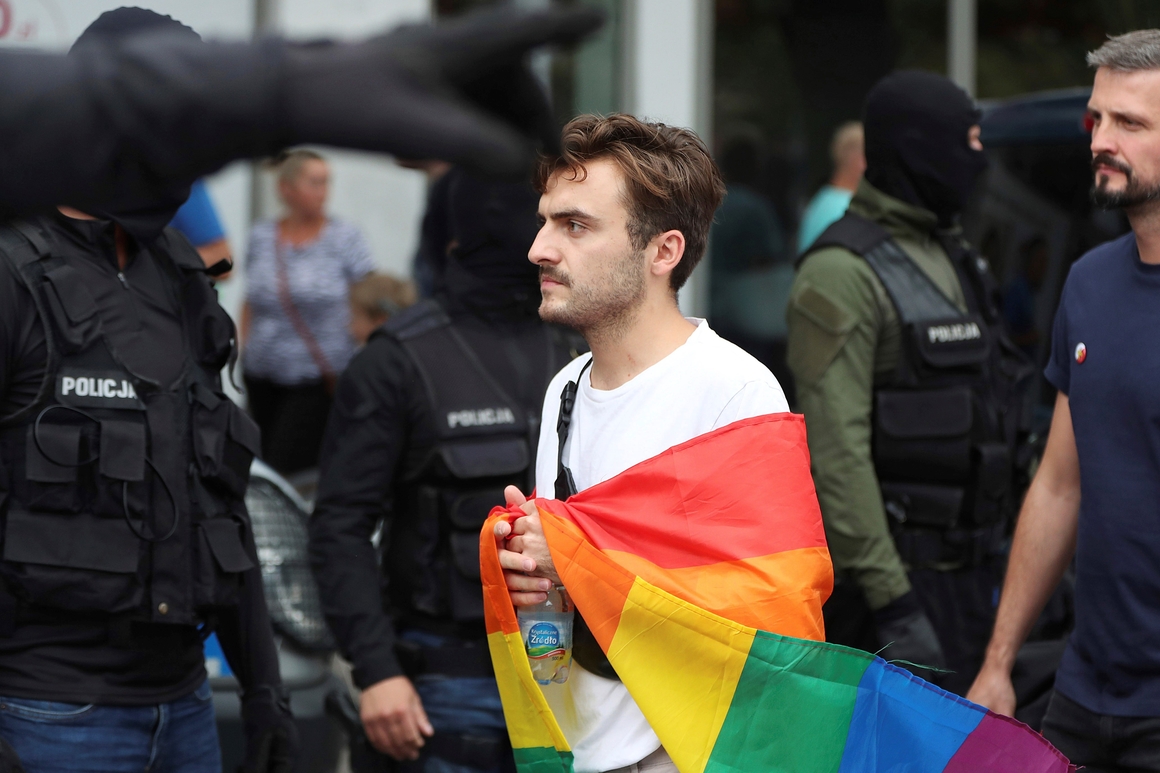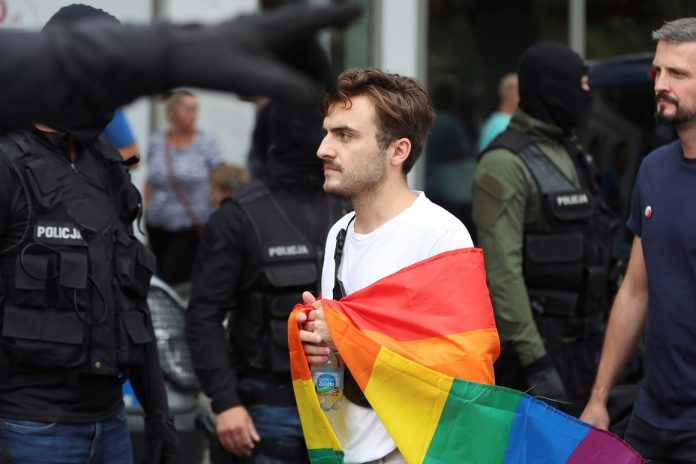
DOUAI, France — At the entrance to the Lycée La Salle Deforest de Lewarde in Douai in Northern France, students are welcomed with a “bonjour” written on the wall in many languages: “guten tag,” “hello,” “buenos días.”
There used to be the Polish “dzień dobry” as well — but it got painted over during a recent renovation. “It was just a mistake, we will bring ‘dzień dobry’ back!” said Diego Mercier, the school’s headmaster.
But while it shouldn’t be too difficult to repaint the greeting, re-establishing a good relationship between schools in Douai and the Polish town of Puławy could prove more problematic — especially after the Polish municipality signed an anti-LGBTQ pledge.
Since 2019, dozens of Polish towns, counties and regions have signed similar declarations and charters. In response, several European towns have ended twinning partnerships with their Polish counterparts.
Last week, the European Commission rejected grants for six Polish towns under a citizens’ program for twin municipalities, linking the decision to the anti-gay declarations.
“Human dignity, freedom, democracy, equality, the rule of law and respect for human rights, including the rights of persons belonging to minorities, are fundamental EU values,” Equality Commissioner Helena Dalli told POLITICO in a statement. “These principles must be applied transversally to all EU funding.”
Decisions like that are putting a real price on the largely symbolic anti-LGBTQ declarations, with many international cultural programs and youth exchanges suspended or canceled.
Take Douai — located in French Flanders, where many Polish people emigrated between the wars to work in the mines. It’s had a twin partnership with Puławy in Eastern Poland since 1996.
In February, Frédéric Chéreau, the mayor of Douai, said he’d found out about Puławy’s declaration and decided to freeze the partnership.
“Many citizens wrote letters to me saying how stunned they were about Puławy’s decision. I really couldn’t sit and do nothing,” he told POLITICO.
His immediate decision was to withhold invitations for Puławy’s officials to Douai. But he didn’t exclude that future exchanges between two high schools would also be suspended.
Mercier, Douai’s high school headmaster, said he understood the mayor’s position. “It’s unbelievable to declare a town an LGBT-free zone,” he said. “It’s crazy, it’s sad.”
But he also stressed that schools had enjoyed a “perfect” partnership for four years. “I hope we’ll get there to separate the youth exchange and the exchange between two cities,” he said.
The headmaster of the high school in Puławy, Marta Gładysz, has similar hopes. “We have put a lot of work in this exchange,” she said. “We should divide the exchange of young people from the [municipality’s] declaration,” she said.
In July, the Dutch town of Nieuwegein also cut its ties with Puławy.
Similar things are happening to other Polish “anti-LGBTQ” towns. France’s Nogent-sur-Oise ended its cooperation with Kraśnik (suspending the exchange of young footballers) and Germany’s Schwerte withheld partnership with Nowy Sącz (threatening the tradition of school exchanges).
‘LGBTQ-free’ Polish towns
Poland is the EU’s most homophobic country, according to a Rainbow Europe ranking out this year. The issue of the LGBTQ community regularly appears in political and public debates. Recently it was used by the ruling Law and Justice (PiS) party to mobilize its most conservative support during the country’s presidential election.
The trend of towns making anti-gay declarations was sparked by a decision last year by Warsaw Mayor Rafał Trzaskowski to sign a city charter pledging support for LGBTQ people.
PiS and conservative organizations said that such initiatives would allow activists to “smuggle LGBT ideology into school” and will “sexualize children.”
In response to Warsaw’s liberal mayor, many smaller Polish towns — usually governed by right-wing mayors — staked out anti-LGBTQ positions. Some endorsed the “Regional Charter of Family Rights,” drafted by the right-wing, catholic NGO Ordo Iuris grouping, and others, like Puławy, came up with their own statements.
The charter doesn’t mention LGBTQ explicitly but calls for the “protection of marriage, being a union of a man and a woman,” which is already safeguarded by the Polish constitution, and says that public funds shouldn’t be spent on “projects that undermine the constitutional identity of marriage.”
The statement endorsed by Puławy states that the town will aim to “stop the ideology promoted by the LGBT subculture.” The city council won’t allow special provisions to help LGBTQ students and will protect public officials, like teachers, from the pressure of “homopropaganda.”
According to the Atlas of Hate project, which collects all the declarations, the towns and regions that have signed some sort of anti-LGBTQ document cover one-third of Poland’s territory.
Puławy says its declaration “doesn’t trigger any specific actions” against the gay community. “There has been no violence in the town,” said a spokesperson.
The mayor also wrote a letter to Douai, in which he argued Puławy “was the object of the media and political attack” and that there’s “no law discriminating against people because of their origin, political opinions or sexual orientation.”
EU steps in
That stance is creating painful financial consequences.
Six Polish towns — the Commission didn’t name them — won’t get extra funds from a town twinning program. Grants range from €5,000 to €25,000.
Commissioner Dalli said the rules of the program are “very clear.” They state that it should be accessible “to all European citizens without any form of discrimination on grounds of sex, racial or ethnic origin, religion or belief, disability, age and sexual orientation.”
“It is my responsibility to ensure that EU values are respected in all our work and in all EU funds,” she added. “It is our duty to protect European citizens from discrimination. Inaction was not an option and would have made the European Commission complicit.”
Poland’s Justice Minister Zbigniew Ziobro called Dalli’s decision “groundless and illegal” and said the Commission had a duty to respect the traditions and views of member countries. He’s asked Prime Minister Mateusz Morawiecki to intervene in Brussels.
In Tuchów, reportedly one of the six towns that didn’t get the grant, the town’s mayor asked the local council to reconsider its anti-gay decision.
“One can’t calculate this image loss. It’s not just €18,000 that we’re losing,” Mayor Magdalena Marszałek told Polish TVN24 television, adding she fears the town’s international partners “won’t treat Tuchów seriously.”
“We won’t have an annual meeting of twin towns … we won’t have the meeting, the talks, the concerts,” she said.
But Andrzej Głaz, head of Tuchów’s local council, isn’t backing down. “I pity those EU actions. I’m waiting until somebody there wises up,” he told the NaTemat website. “One can live poorly but with dignity,” he added.
The post Polish towns pay a steep price for anti-LGBTQ views appeared first on Politico.







